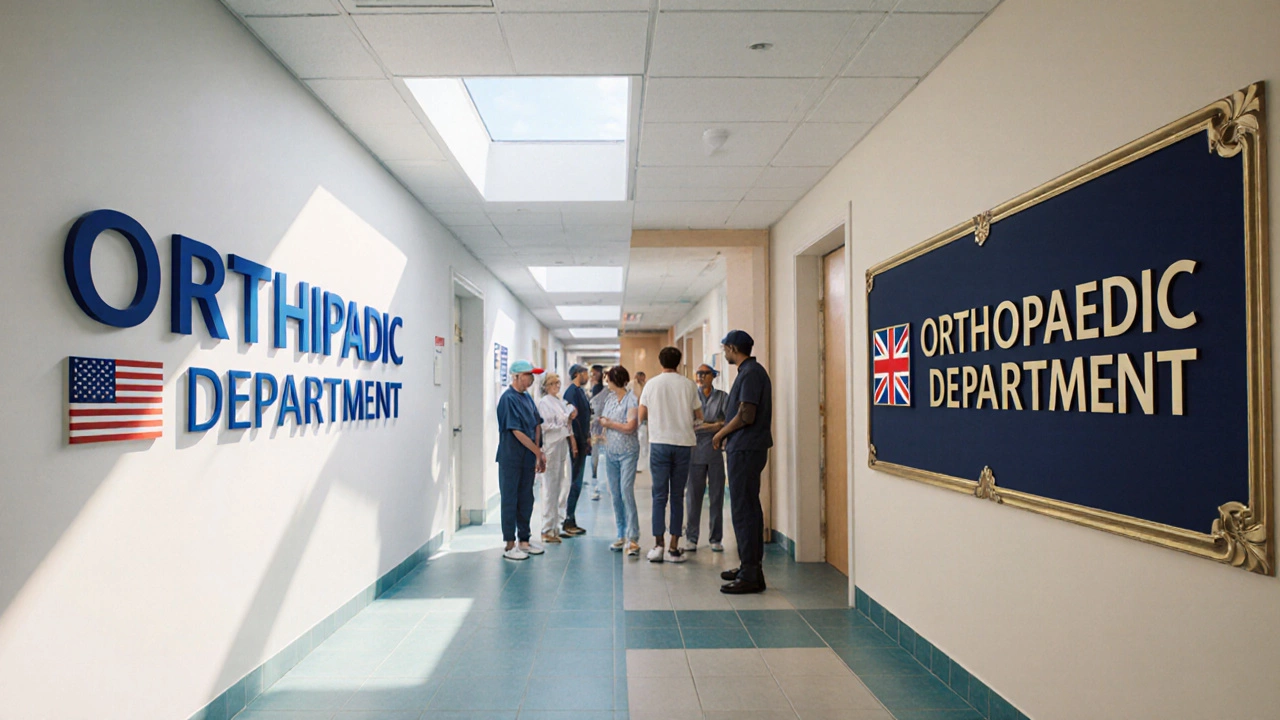Orthopedic/Orthopaedic Spelling Checker
Which Spelling is Right for You?
Select your target audience's primary region to see the correct spelling for medical contexts.
Ever wondered why the same medical field sometimes appears with an extra "a" in the middle? The answer isn’t about two separate specialties - it’s a spelling story that travels across oceans.
Key Takeaways
- Orthopedic is the American spelling; orthopaedic is the British spelling.
- Both refer to the same medical discipline dealing with bones, joints, and related structures.
- Hospital signage, research papers, and web content usually follow regional conventions.
- Choosing the right spelling matters for SEO, patient trust, and professional consistency.
- Medical dictionaries and style guides provide clear guidance on when to use each form.
What Do the Words Mean?
Orthopedic is the branch of medicine that focuses on the musculoskeletal system - bones, joints, ligaments, tendons and muscles. It covers everything from fracture care to joint replacement and spinal surgery. The term comes from Greek roots: orthos (straight) and paideia (child‑rearing or education), meaning “to straighten or correct”.
Orthopaedic is the exact same definition, only the spelling follows the conventions of British English. No difference in meaning, training, or scope - just a regional preference.
Historical Roots of the Two Spellings
The word entered English in the early 19th century through medical journals. American practitioners quickly dropped the extra “a” to simplify the spelling, mirroring a broader U.S. trend of trimming British forms (e.g., ‘theater’ vs ‘theatre’). The UK retained the original Greek‑based spelling, and many Commonwealth countries followed suit.
Key milestones include:
- 1825 - First appearance in an American medical textbook as “orthopedic”.
- 1881 - British Medical Journal adopts “orthopaedic” for consistency with other Greek‑derived terms.
- 20th century - International medical societies standardize the definition, leaving spelling as a matter of regional style.
Regional Preferences in Everyday Use
Here’s a quick snapshot of where each spelling dominates:
| Spelling | Primary Region | Typical Pronunciation | Common Context |
|---|---|---|---|
| Orthopedic | United States, Canada, Philippines, India (medical schools following U.S. curricula) | or‑THOP‑e‑tɪk | Hospital department names, insurance forms, SEO‑focused websites targeting US audiences |
| Orthopaedic | United Kingdom, Australia, New Zealand, Ireland, South Africa, India (British‑linked institutions) | or‑THOP‑ae‑tɪk | Academic journals published in UK, NHS hospital signage, UK‑centric health blogs |

Does the Spelling Change the Clinical Meaning?
In clinical practice, the answer is a resounding “no”. Whether a doctor writes orthopedic or orthopaedic on a prescription, the patient receives the same care. The International Classification of Diseases (ICD‑10) lists the specialty under code “M00-M99” without regard to spelling. Medical licensing boards also treat them as synonyms.
The only practical differences appear in documentation:
- Electronic Health Record (EHR) templates may auto‑populate the spelling based on the system’s locale.
- Insurance claim forms often require the spelling that matches the payer’s regional guidelines.
- Academic citations must follow the journal’s style guide, which may dictate British or American spelling.
Hospital Signage and Branding
When you walk into a hospital, the way the department is labeled can signal the institution’s cultural orientation. For example:
- Orthopedic Center - typical in U.S. health systems like Mayo Clinic or Cleveland Clinic.
- Orthopaedic Department - common in NHS hospitals such as St. Thomas' Hospital (London) or in private UK clinics.
Even in India, you’ll find both spellings side by side. The city of Bangalore hosts many “Orthopedic Hospitals” that follow American naming conventions, while some older institutions, founded during the British era, retain “Orthopaedic”. The difference doesn’t affect the quality of care, but it does influence patients’ perception of credibility.
SEO Implications: Why One Letter Matters Online
Search engines treat “orthopedic” and “orthopaedic” as separate query strings. If you run a clinic in the U.S. and optimise only for “orthopaedic”, you may miss out on a sizable portion of local traffic. Conversely, a UK‑based practice that focuses on “orthopedic” could appear less relevant to British users.
Best practice:
- Identify your primary audience’s region.
- Use the corresponding spelling in page titles, meta descriptions, and header tags.
- Include the alternate spelling in body copy (once or twice) to capture cross‑regional searches.
- Leverage schema markup (as shown above) to reinforce that both terms point to the same medical specialty.
Google’s Natural Language Understanding can recognise synonyms, but explicit spelling alignment still boosts relevance scores.

Writing Tips: When to Choose Which Spelling
Here’s a quick cheat‑sheet for content creators:
- Targeting U.S. patients, insurers, or academic journals - use orthopedic.
- Writing for UK media, NHS documents, or British‑based research - use orthopaedic.
- International medical conferences - you can mention both, e.g., “Orthopedic (orthopaedic) surgery advances”.
- In bilingual marketing materials - keep the spelling consistent within each language version.
Consistency is the key driver of trust. Mixing spellings on the same page can look sloppy and may lower perceived authority.
Common Misconceptions and Pitfalls
Some readers think the extra “a” denotes a sub‑specialty, such as “orthopaedic trauma” vs “orthopedic trauma”. In reality, both phrases describe the same focus - injury‑related bone and joint care. The sub‑specialty is defined by the clinical context, not the spelling.
Another myth is that “orthopaedic” sounds more “scientific”. It’s simply the original Greek‑based form, preserved by British English. Neither version is more correct; they’re equally valid.
Frequently Asked Questions
Is there any clinical difference between orthopedics and orthopaedics?
No. Both terms describe the same specialty that treats bones, joints, muscles, ligaments and tendons. The variation is purely regional spelling.
Which spelling should I use on my clinic’s website?
Match the spelling to the primary geographical audience. Use orthopedic for U.S. and Canada‑focused sites, and orthopaedic for UK, Australia, New Zealand, or any British‑aligned market.
Do medical dictionaries list both spellings?
Yes. Merriam‑Webster lists “orthopedic” as the American spelling, while the Oxford English Dictionary records “orthopaedic” as the British version. Both entries reference the same definition.
Can using the wrong spelling affect my search rankings?
Potentially. Search engines treat each spelling as a separate keyword phrase. Optimising for the audience’s preferred spelling helps capture the right traffic and signals relevance.
Is there any legal requirement for spelling on medical documents?
Regulatory bodies focus on accuracy of diagnosis and treatment, not on orthography. However, adhering to local style guides can avoid administrative delays.
Wrapping It Up
Whether you write orthopedic or orthopaedic, you’re talking about the same life‑changing specialty that helps people walk, run, and live without pain. The choice of spelling is a cultural cue, not a medical one. Keep the audience in mind, stay consistent, and you’ll avoid confusion while boosting credibility - both offline in hospitals and online in search results.
